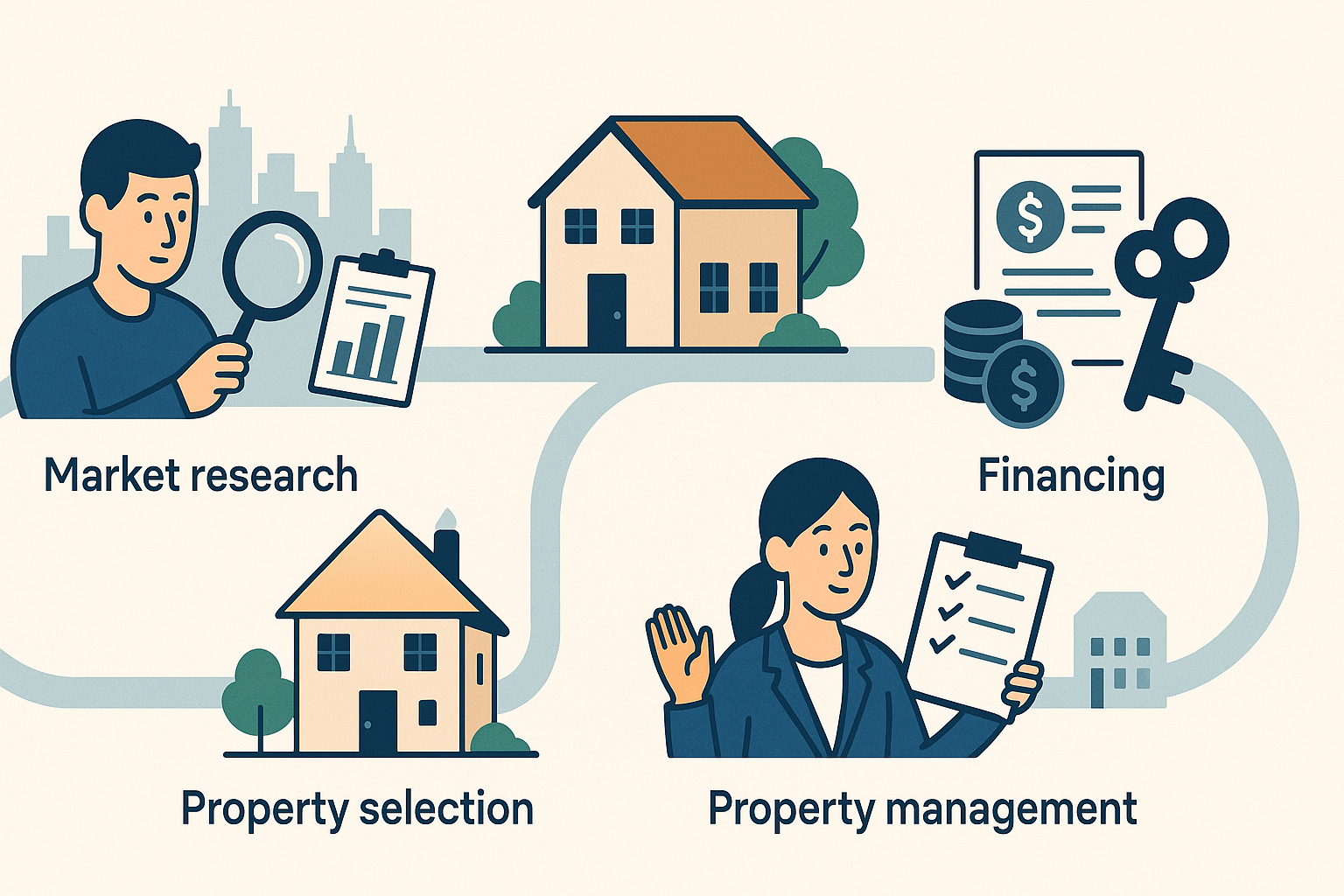Introduction
Investing in real estate has long been a cornerstone of wealth building, offering individuals the chance to secure financial stability and long-term growth. If you are seeking to understand the essentials of property investment, this comprehensive guide to Property Investment 101 will equip you with the knowledge and strategies necessary to navigate the world of real estate. Property investment is not merely about purchasing property; it is a strategic approach to growing wealth through careful planning, market understanding, and informed decision-making.
The path to becoming a successful real estate investor begins with understanding the fundamentals of property acquisition, financing, management, and market analysis. In this guide, you will discover the step-by-step processes involved in building an investment property portfolio, including critical aspects like financing options, property evaluation, and long-term sustainability. Additionally, you will learn how to avoid common pitfalls, maximize returns, and leverage real estate for both passive income and capital appreciation.
Understanding the intricacies of property investment can be daunting, especially for beginners. However, with the right strategies, even those new to the market can build substantial wealth. Whether you are exploring how to get into property investment, how to invest in real estate with little money, or simply seeking tips on purchasing an income property, this guide will serve as your go-to resource.
You may also like: The Ultimate Guide to Finding the Best Cheap Tech Stocks for Smart Investing

Defining Property Investment 101
To embark on a successful real estate journey, one must first understand what property investment entails. Property Investment 101 is essentially the foundational knowledge required to buy, manage, and profit from real estate ventures. Unlike other forms of investment, real estate is tangible, appreciating over time and offering various avenues for revenue, including rental income, property flipping, and commercial leasing.
The key to thriving in real estate lies in understanding different property types—residential, commercial, industrial, and mixed-use—and recognizing which align with your investment goals. Residential properties include single-family homes, multi-family units, and condominiums, typically offering stable rental income. Commercial properties, such as office buildings and retail spaces, often yield higher returns but come with increased risks. Understanding the advantages and limitations of each type is crucial to making informed investment decisions.
Moreover, real estate investment strategies vary significantly based on market conditions, location, and financial capacity. For beginners, focusing on building an investment property that is manageable and located in growth areas can lead to substantial financial gains. Advanced investors often explore real estate trading or purchase large-scale commercial properties for expansive growth. Regardless of experience level, mastering Property Investment 101 empowers investors to make educated choices, minimize risks, and maximize returns.

The Benefits of Real Estate Investing
Real estate investment is widely regarded as one of the most reliable ways to build wealth. Unlike volatile markets like stocks or cryptocurrencies, property values tend to appreciate steadily over time, providing a hedge against inflation. Moreover, real estate investments offer several advantages, including passive income generation, tax benefits, and portfolio diversification.
One of the primary attractions of real estate is its ability to generate passive income. By purchasing rental properties, investors can earn a steady stream of income with minimal day-to-day involvement. This income not only covers property expenses but also contributes to overall profit margins. Over time, rental rates typically increase, further boosting revenue without the need for significant additional investment.
Tax benefits are another compelling reason to consider property investment. Investors can deduct expenses such as mortgage interest, property taxes, insurance, and maintenance costs from their taxable income. Additionally, depreciation allows property owners to reduce taxable income further, even as their properties appreciate in value. These financial incentives can significantly enhance the profitability of real estate investments.
Real estate also serves as a strong diversification tool within an investment portfolio. Unlike stocks, which are susceptible to market swings, property investments provide stability and consistent value appreciation. This diversification helps mitigate risk and balance potential losses from other market sectors. As part of a broader wealth-building strategy, real estate remains a cornerstone of financial growth and security.
In the following sections, we will delve deeper into the critical components of real estate investment, offering insights into how to find investment real estate, secure financing, and develop sustainable growth strategies. Whether you are a novice or an experienced investor, mastering Property Investment 101 will pave the way for long-term wealth and financial independence.

How to Get Started with Property Investment 101
Entering the world of real estate investing can seem intimidating, but with a solid understanding of Property Investment 101, you can build a roadmap that guides your decisions effectively. The first step involves setting clear financial goals and understanding your investment capacity. Knowing how much you can afford to invest, as well as the type of property that aligns with your financial objectives, is crucial.
Next, educate yourself on the local real estate market. Research property values, rental trends, and future development plans in the area you wish to invest. Understanding market dynamics helps you make informed choices and identify properties with high growth potential. Additionally, familiarize yourself with the various financing options available, including traditional mortgages, government-backed loans, and private lending solutions.
Partnering with real estate professionals, such as agents and financial advisors, can also provide invaluable insights and streamline the purchasing process. They can help you navigate legal requirements, identify lucrative opportunities, and avoid common pitfalls that many beginner investors face. As you progress, building a network of contacts within the industry can further enhance your investment success.
Finally, develop a long-term plan for property management and growth. Whether you intend to flip properties for quick profits or hold them for rental income, having a clear strategy in place will ensure your investments are sustainable and profitable in the long run.

Finding the Right Property: What to Look For
One of the most critical aspects of property investment is finding the right property. This step requires thorough research and strategic thinking. Understanding local markets, property conditions, and growth potential can significantly impact your investment’s success. Begin by identifying areas with strong economic growth, low unemployment rates, and a rising population, as these factors typically indicate a healthy real estate market.

Property Investment 101 FAQ
What is Property Investment 101 and why is it important?
Property Investment 101 is the foundational knowledge required for understanding the essentials of real estate investing. It includes learning how to acquire, manage, and grow wealth through properties. Mastering these basics is crucial because real estate is one of the most stable and lucrative investment options available. Unlike volatile markets like stocks, real estate tends to appreciate over time, providing long-term financial security. Additionally, the ability to generate passive income through rental properties and benefit from tax incentives makes real estate a preferred choice for wealth building.
How do you start investing in real estate if you are a beginner?
Starting your journey in real estate investing begins with education and research. It’s essential to understand key concepts such as property valuation, market analysis, and financing options. Once you have a grasp of the basics, the next step is to determine your investment budget and explore different types of properties like residential or commercial. Consulting with real estate professionals and networking with other investors can also provide insights into local markets and investment opportunities. Finally, developing a long-term strategy that includes how to find investment real estate and manage properties effectively is vital for success.
How can I invest in property with limited capital?
One of the most common challenges for new investors is figuring out how to invest in real estate with little money. Fortunately, there are several strategies to enter the market with minimal capital. Options include leveraging government programs that offer low down payment options, partnering with other investors, or exploring real estate crowdfunding platforms. Additionally, owner financing and lease-to-own agreements can provide pathways to property ownership without significant upfront costs. Strategic planning and exploring creative financing options can help you begin building an investment property portfolio even with limited resources.
What are the key strategies for building an investment property portfolio?
To build an investment property portfolio, it’s crucial to adopt a strategic and disciplined approach. This includes diversifying property types, focusing on high-growth areas, and reinvesting rental income into additional properties. Understanding the nuances of purchasing investment property, such as market timing and location analysis, also plays a significant role. Many successful investors use the ‘BRRRR’ method—Buy, Rehab, Rent, Refinance, Repeat—to expand their holdings efficiently. Additionally, maintaining a balance between short-term cash flow and long-term appreciation is essential for sustainable growth.
How do I secure financing for my real estate investment?
Financing is a critical component of real estate investing, and there are various options to consider. Traditional mortgages are the most common, but there are also government-backed loans for first-time investors. For those exploring how to purchase real estate with minimal down payment, FHA loans or VA loans are viable choices. Beyond conventional methods, private lenders and real estate investment groups can provide additional funding opportunities. Understanding the terms, interest rates, and repayment structures of each option is crucial for effective financial planning.
What should I look for when buying investment property?
When buying investment property, several factors should be considered to ensure profitability and sustainability. Location is paramount; properties in areas with economic growth, low crime rates, and good schools tend to appreciate faster. Additionally, analyzing the property’s condition, potential rental income, and community development plans is crucial. Researching market trends and understanding the local real estate climate will also help in making informed purchasing decisions. For long-term success, always prioritize properties that align with your financial goals and investment strategy.
How important is property management in real estate investing?
Effective property management is vital for maximizing the returns on your investment. Proper maintenance, tenant screening, and efficient handling of leases and rent collection are key aspects. Many investors choose to manage properties themselves, while others hire professional property management firms to streamline operations. Well-managed properties not only retain their value but also attract higher-quality tenants. Investing in good property management ultimately protects your assets and ensures steady cash flow.
What are the tax benefits of real estate investing?
Real estate investors enjoy several tax benefits that enhance profitability. These include deductions for mortgage interest, property taxes, and depreciation. Depreciation allows investors to write off a portion of the property’s value each year, even if its market value increases. Moreover, capital gains tax can be deferred through a 1031 Exchange when reinvesting in another property. Understanding these tax advantages can significantly improve your returns and reduce overall investment costs.
Is it better to focus on residential or commercial real estate for beginners?
For beginners, residential real estate is often recommended due to its lower entry costs and simpler management requirements. Properties like single-family homes and small multi-family units tend to have consistent demand and are easier to finance. Commercial properties, while potentially more profitable, come with higher risks, larger capital requirements, and complex management needs. As investors gain experience, diversifying into commercial real estate can be a strategic way to enhance portfolio growth.
How do I scale my real estate investments over time?
Scaling real estate investments involves strategic planning and reinvestment. As you accumulate properties, reinvesting rental income and leveraging equity through refinancing can help fund additional purchases. Partnering with other investors and exploring real estate syndications are also effective methods for expanding your portfolio. Maintaining a focus on high-growth markets and diversifying property types will further enhance your investment strategy. Over time, these methods allow for exponential growth and increased financial security.
Conclusion
Real estate investing remains one of the most effective ways to build long-term wealth and financial security. Through strategic planning, careful market analysis, and understanding the principles of Property Investment 101, investors can navigate the complexities of property acquisition, management, and growth with confidence. Unlike many other investment avenues, real estate provides tangible assets that appreciate over time, generate passive income, and offer significant tax advantages.
For beginners and seasoned investors alike, mastering the fundamentals of real estate investment unlocks opportunities for wealth creation and financial independence. Whether you aim to purchase your first rental property, expand a growing portfolio, or venture into commercial real estate, the strategies outlined in this guide will serve as a comprehensive roadmap to success.
As you move forward in your property investment journey, remember that knowledge, patience, and strategic decision-making are your greatest assets. The principles of Property Investment 101 are not just foundational; they are transformative. With dedication and informed choices, real estate can become the cornerstone of your wealth-building strategy, paving the way for a prosperous and secure financial future.
Further Reading:
5 Simple Ways to Invest in Real Estate
Real Estate Investing for Beginners: 5 Skills of Successful Investors





